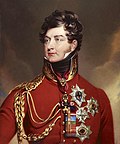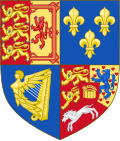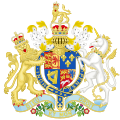Top Qs
Timeline
Chat
Perspective
King of Hanover
Head of state and hereditary ruler of the Kingdom of Hanover From Wikipedia, the free encyclopedia
Remove ads
The King of Hanover (German: König von Hannover) was the official title of the head of state and hereditary ruler of the Kingdom of Hanover, beginning with the proclamation of King George III of the United Kingdom, as "King of Hanover" during the Congress of Vienna, on 12 October 1814 at Vienna, and ending with the kingdom's annexation by Prussia on 20 September 1866.
Remove ads
History
Summarize
Perspective
In 1692, the Holy Roman Emperor Leopold I elevated the Duchy of Brunswick-Lüneburg to the status of an Electorate, known as the Electorate of Hanover. This elevation allowed the Electors of Hanover to participate in the election of the Holy Roman Emperor and significantly increased their political influence. The first Elector of Hanover was Ernest Augustus, whose son, George Louis, ascended to the British throne as George I in 1714 due to the Act of Settlement 1701 and ensured a Protestant succession. This personal union of the British crown and the Electorate of Hanover lasted until 1837.
The Electorate of Hanover became the Kingdom of Hanover in 1814, following the defeat of Napoleon and the reorganization of German territories at the Congress of Vienna. The Kingdom was granted to George III, who had ruled the Electorate of Hanover with the title of Prince-elector. This marked Hanover's rise to greater political significance within the German Confederation. However, the dual monarchy system created complexities, especially as the British and Hanoverian thrones had separate succession laws. When Queen Victoria ascended the British throne in 1837, Hanoverian semi-Salic law (agnatic-cognatic) gave priority to all male lines before female lines. Consequently, Victoria's uncle, Ernest Augustus, Duke of Cumberland, became King of Hanover.
The Kingdom of Hanover faced significant challenges during the mid-19th century, particularly during the Austro-Prussian War in 1866. Despite aligning with the Austrian Empire, Hanover was annexed by Kingdom of Prussia after Austria's defeat, thereby forfeiting its autonomy as a kingdom. Subsequently, the region became part of the German Empire in 1871, following Prussia's unification of Germany. Local resistance and regional loyalty led Hans von Hardenberg, the civil commissioner who oversaw the integration of Hanover into Prussia, to remark that:
As a whole the Hanoverians are a tougher, less accommodating tribe than the Saxons. Their particularism rests not solely on Prussophobia ... but above all on a deep-rooted conviction that life is nowhere better than in Hanover. Theirs is a solid ... national feeling.
— Hans von Hardenberg [1]
The protests of George V of Hanover and the local population proved to be an effective obstacle to Hanover's assimilation into Prussia, and led to the founding of the German-Hanoverian Party, which received 46.6% of the Hanoverian vote in the March 1871 Reichstag election.[2]
Remove ads
List of Electors of Hanover
Summarize
Perspective
Ernest Augustus was appointed as the first Elector of Hanover in 1692, but he died in 1698 before the Imperial Diet confirmed the elevation of Hanover to the status of an Electorate in 1708. His widow, Sophia of Hanover, was still known as Electress of Hanover. Their son was George I.
Remove ads
List of Kings of Hanover
Standard and coat of arms
After the personal union with Great Britain ended in 1837, the monarchs of Hanover kept the British royal arms and standard, only introducing a new Crown (after the British model).
- Royal Standard of Hanover
- Arms of the House of Hanover
- Coat of arms of the Monarchs of Great Britain, Ireland, and Hanover (1714)
- Coat of arms of Hanoverian Monarchs of Great Britain used in Scotland
- Arms of the Hanoverian Kings of Great Britain and Ireland (1714–1801)
- Arms of the Hanoverian Kings of the United Kingdom (1816–1837)
- Arms of the Hanoverian Kings of the United Kingdom in Scotland (1816–1837)
- Coat of arms of the Kingdom of Hanover 1837
Remove ads
See also
- Kingdom of Hanover
- Electorate of Hanover
- House of Hanover
- History of Hanover
- Hanoverian prince
- Personal union of Great Britain and Hanover
- German Chancery
References
Wikiwand - on
Seamless Wikipedia browsing. On steroids.
Remove ads






















